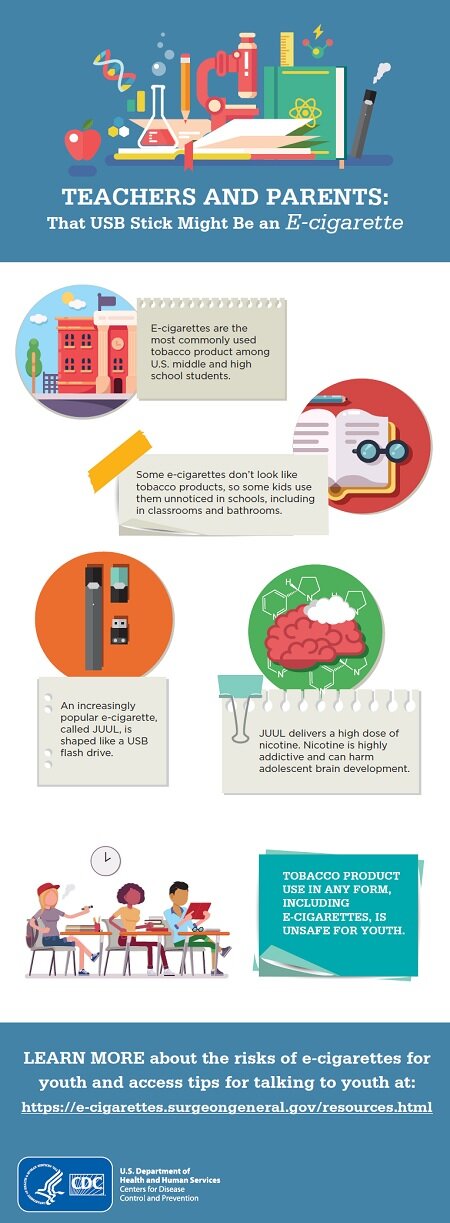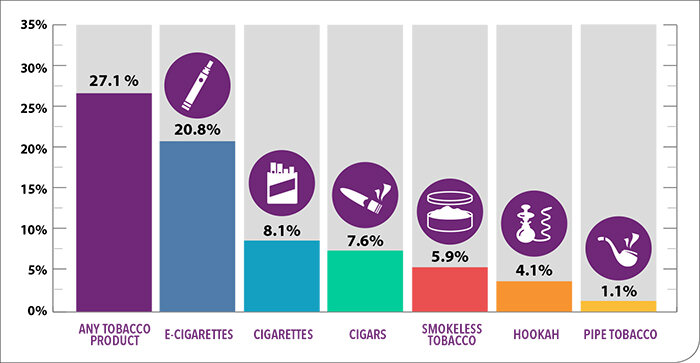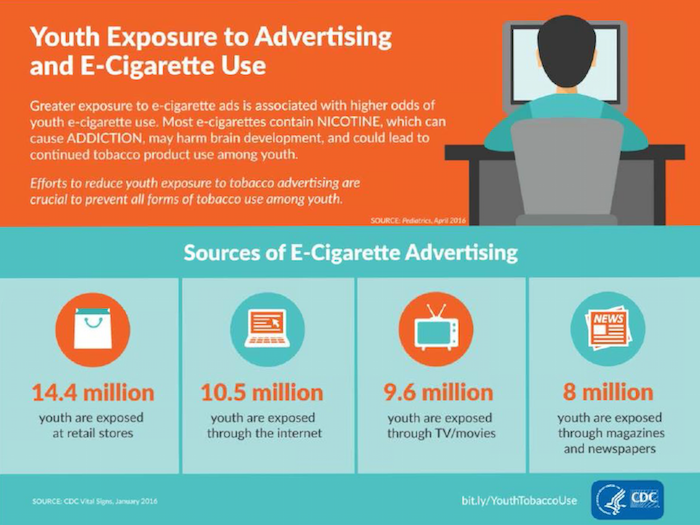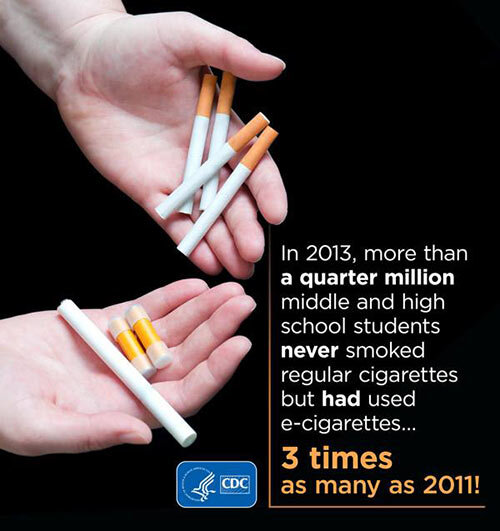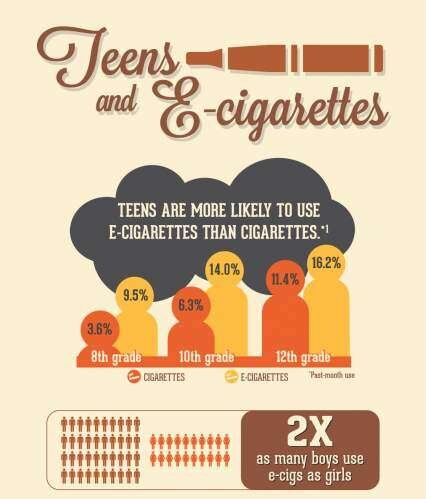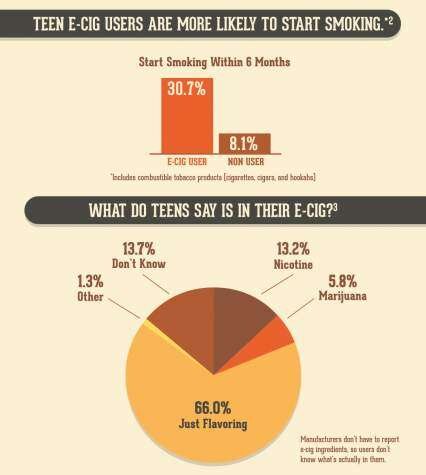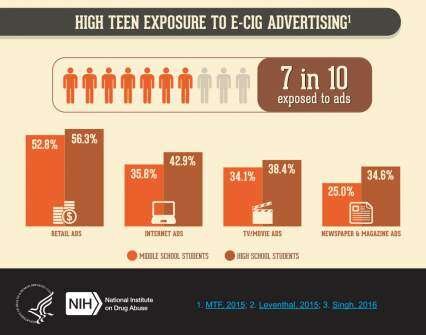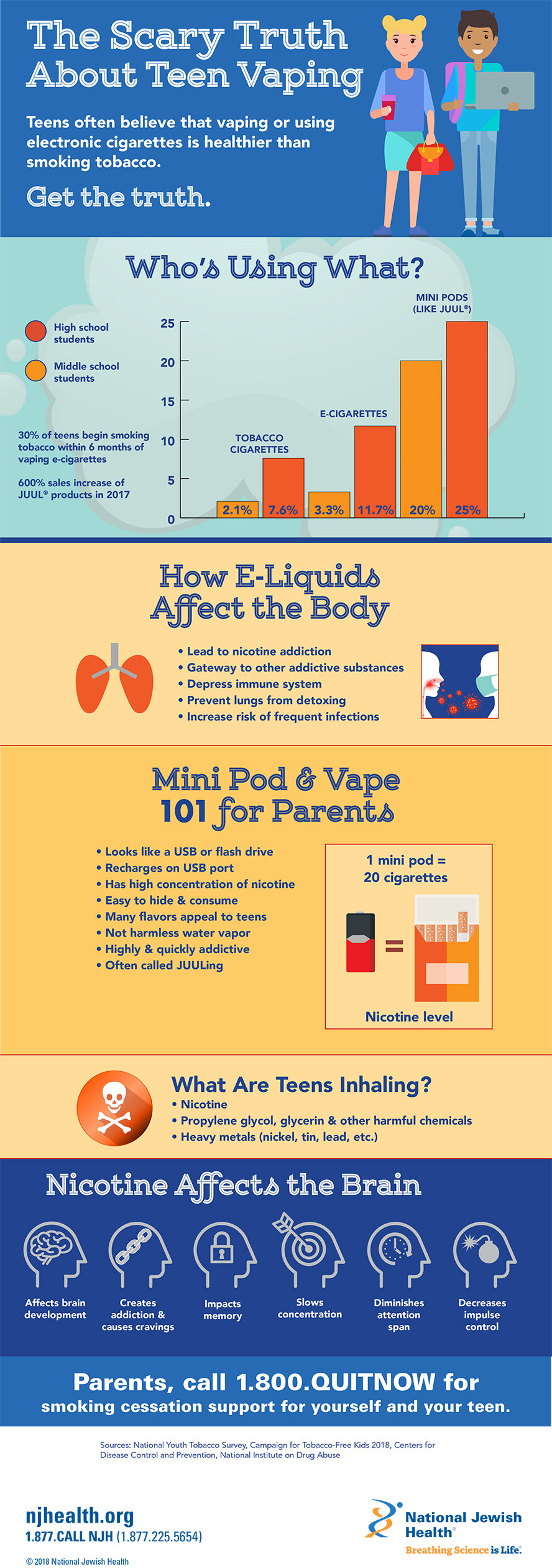Youth Tobacco Use and Vaping Prevention
Tobacco use and smoking do damage to nearly every organ in the human body, often leading to lung cancer, respiratory disorders, heart disease, stroke, and other illnesses. Below are some great resources to help others you may know or yourself with tobacco cessation. Fill out the form below for your chance to win an Amazon Gift Card!
What’s the Bottom Line on the Risks of E-cigarettes for Kids, Teens, and Young Adults?
The use of e-cigarettes is unsafe for kids, teens, and young adults.
Most e-cigarettes contain nicotine. Nicotine is highly addictive and can harm adolescent brain development, which continues into the early to mid-20s.1
E-cigarettes can contain other harmful substances besides nicotine.
Young people who use e-cigarettes may be more likely to smoke cigarettes in the future.
What Are E-cigarettes?
E-cigarettes are electronic devices that heat a liquid and produce an aerosol, or mix of small particles in the air.
E-cigarettes come in many shapes and sizes. Most have a battery, a heating element, and a place to hold a liquid.
Some e-cigarettes look like regular cigarettes, cigars, or pipes. Some look like USB flash drives, pens, and other everyday items. Larger devices such as tank systems, or “mods,” do not look like other tobacco products.
E-cigarettes are known by many different names. They are sometimes called “e-cigs,” “e-hookahs,” “mods,” “vape pens,” “vapes,” “tank systems,” and “electronic nicotine delivery systems (ENDS).”
Using an e-cigarette is sometimes called “vaping” or “JUULing.”
Why Is Nicotine Unsafe for Kids, Teens, and Young Adults?
Most e-cigarettes contain nicotine—the addictive drug in regular cigarettes, cigars, and other tobacco products.
A recent CDC study found that 99% of the e-cigarettes sold in assessed venues in the United States contained nicotine.
Some e-cigarette labels do not disclose that they contain nicotine, and some e-cigarettes marketed as containing 0% nicotine have been found to contain nicotine.
Nicotine can harm the developing adolescent brain.1 The brain keeps developing until about age 25.
Using nicotine in adolescence can harm the parts of the brain that control attention, learning, mood, and impulse control.1
Each time a new memory is created or a new skill is learned, stronger connections – or synapses – are built between brain cells. Young people’s brains build synapses faster than adult brains. Nicotine changes the way these synapses are formed.
Using nicotine in adolescence may also increase risk for future addiction to other drugs.1
Scientists are still learning about the long-term health effects of e-cigarettes.
Some of the ingredients in e-cigarette aerosol could also be harmful to the lungs in the long-term. For example, some e-cigarette flavorings may be safe to eat but not to inhale because the gut can process more substances than the lungs.1
Defective e-cigarette batteries have caused some fires and explosions, a few of which have resulted in serious injuries.
Children and adults have been poisoned by swallowing, breathing, or absorbing e-cigarette liquid through their skin or eyes. Nationally, approximately 50% of calls to poison control centers for e-cigarettes are for kids 5 years of age or younger.
What Is in E-cigarette Aerosol?
E-cigarette aerosol is NOT harmless “water vapor.”
The e-cigarette aerosol that users breathe from the device and exhale can contain harmful and potentially harmful substances, including:NicotineUltrafine particles that can be inhaled deep into the lungsFlavorings such as diacetyl, a chemical linked to a serious lung diseaseVolatile organic compoundsCancer-causing chemicalsHeavy metals such as nickel, tin, and lead1
The aerosol that users inhale and exhale from e-cigarettes can expose both themselves and bystanders to harmful substances.
It is difficult for consumers to know what e-cigarette products contain. For example, some e-cigarettes marketed as containing zero percent nicotine have been found to contain nicotine.3
Ways to Quit Smoking
Most former smokers quit without using one of the treatments that scientific research has shown can work. However, the following treatments are proven to be effective for smokers who want help to quit:
Brief help by a doctor (such as when a doctor takes 10 minutes or less to give a patient advice and assistance about quitting)
Individual, group, or telephone counseling
Behavioral therapies (such as training in problem solving)
Treatments with more person-to-person contact and more intensity (such as more or longer counseling sessions)
Programs to deliver treatments using mobile phones
Medications for quitting that have been found to be effective include the following:
Nicotine replacement products
Over-the-counter (nicotine patch [which is also available by prescription], gum, lozenge)
Prescription (nicotine patch, inhaler, nasal spray)
Counseling and medication are both effective for treating tobacco dependence, and using them together is more effective than using either one alone.
More information is needed about quitting for people who smoke cigarettes and also use other types of tobacco.
Here is a list of resources from the State of Michigan.
American Cancer Society offers quit tobacco resources. 1-248-663-3454 or 1-800-227-2345. www.cancer.org
American Heart Association offers printed material. 1-800-242-8721. www.americanheart.org
American Legacy Foundation offers online assistance and referrals to community programs. http://www.becomeanex.org/
American Lung Association offers quit smoking classes, printed material, quit tobacco website. 1-800-586-4872. Also offers telephone quit advice. 1-800-548-8252. www.lungusa.org
Centers for Disease Control and Prevention has several free quit tobacco guides, booklets and fact sheets. http://www.cdc.gov/tobacco/quit_smoking/how_to_quit/index.htm Offers a complete Website for tobacco users who want to quit. www.smokefree.gov.
Women: www.women.smokefree.gov
Teens: www.teen.smokefree.gov.
Texting: http://smokefree.gov/smokefreetxt
Smartphone App: http://www.smokefree.gov/apps/
Michigan Department of Community Health Tobacco Section website offers information on secondhand smoke, quitting and much more. www.michigan.gov/tobacco.
The Michigan Tobacco Quitline offers free information and tobacco treatment referral 24 hours/day at 1-800-QUIT-NOW (1-800-784-8669) or 1-855-DÉJELO-YA (1-855-335-3569). Free counseling and NRT may be available to certain callers. https://michigan.quitlogix.org/
National Cancer Institute offers telephone advice (1-877-448-7848, M-F, 9 am-4:30 pm) and a quit kit at http://www.cancer.gov/cancertopics/tobacco/smoking.. Online counselors are available M-F, 9 am-11 pm at: www.cancer.gov/help
The Asian Smokers Quitline offers Asian-language quit smoking service. The Quitline offers selfhelp materials, one-on-one telephone counseling to quit smoking, and a free two-week starter kit of nicotine patches. Chinese (Cantonese and Mandarin): 1-800-838-8917, Korean: 1-800-556-5564, Vietnamese: 1-800-778-8440 11:00 am-midnight M-F
Nicotine Anonymous offers telephone support. 415-750-0328. www.nicotine-anonymous.org
QuitNet offers an online quit smoking program including support from a network of ex-tobacco users. www.quitnet.com
U.S. Department of Health and Human Services displays tobacco related “frequently asked questions,” a quit challenge blog and much more. http://betobaccofree.hhs.gov/
National Alliance on Mental Illness-NAMI Hearts and Minds offer




